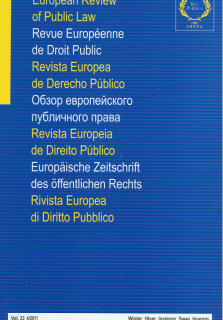
Constitutional Law / Droit constitutionnel
2010
POLAND / POLOGNE
KRZYSZTOF WOJTYCZEK
Professor at the Jagiellonian University
In 2010, the Polish institutional practice was marked by the tragic death of the President of the Republic in the crash of the presidential aircraft in Russia on 10 April. The presidential election that followed put an end to the cohabitation. The attempt to include in the Polish Constitution a new chapter on the relationship with the EU failed. This question is now regulated by a piece of ordinary legislation, enacted in 2010. Several other important statutes were enacted that year, pertaining to the Catholic Church claims for indemnity, protection of State secrecy, equal treat¬ment, the Supreme Chamber of Control, the Tribunal of State and the Institute of National Remembrance. In 2010, the Sejm elected four new judges of the Constitutional Tribunal. This latter State organ delivered a certain number of fundamental judgments on hard cases both on problems of relationship between State authorities and on fundamental rights. The jurisprudence of the Tribunal was not marked by radical ruptures but it is rather possible to discern continuity with a few slight shifts on some points. Several important judgments deal with the communist past and the problems of transitional justice.
En 2010, la pratique institutionnelle polonaise a été marquée par la mort tragique du Président de la République dans un accident d'avion en Russie, le 10 avril. L'élection présidentielle qui a suivi a mis un terme à la cohabitation. La tentative d'introduire dans la Constitution polonaise un nouveau chapitre sur les relations avec l'Union européenne a échoué. Ces questions sont actuellement régies par la nouvelle loi ordinaire adoptée en 2010. Au cours de cette même année, plusieurs autres lois importantes ont été adoptées, concernant notamment les demandes d'indemnisation de la part de l'Eglise Catholique, la protection du secret d'Etat, l'égalité de traitement, la Chambre Suprême de contrôle, le Tribunal d'Etat et l'Institut de la Mémoire nationale. En 2010, la Diète a élu 4 nouveaux juges du Tribunal constitutionnel. Ce dernier organe a rendu un certain nombre d'arrêts importants tranchant des cas difficiles, concernant les relations entre les pouvoirs publics et les droits fondamentaux. La jurisprudence du Tribunal n'a pas été marquée par des ruptures radicales mais plutôt par la continuité avec quelques infléchissements sur certains points. Plusieurs décisions importantes concernent le passé communiste et la justice transitoire.





















